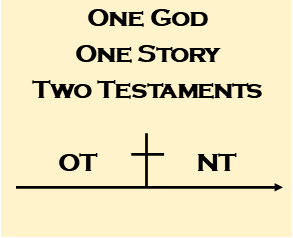By Deanna Huff, Ph.D., Th.M. | June 25, 2023
Accusations of God in the Old Testament
Few people would disagree that some difficult Old Testament (OT) passages exist. The first-century heretic, Marcion, made attempts to dismiss the God of the OT as a God who is pernicious and monstrous. His erroneous view of Yahweh also gave him an inaccurate picture of Jesus in the New Testament (NT). Therefore, he began modifying any NT passages dependent on the OT because he considered the two Testaments to portray two different gods. This misunderstanding of God led Marcion to revise the book of Luke and ten of Paul’s Letters.
Today there are modern-day Marcionites, and it is no surprise to hear the question, Is God monstrous in the OT? The OT, for many, can stir up accusations of Yahweh. For example, God is cruel, angry, and full of judgment. Incorrectly reading the OT can hinder a proper understanding of Jesus in the NT. The focus of this article is not to explain away exceedingly difficult passages as if they are easily addressed but rather to observe the larger picture in hopes of seeing that the God of the OT is the same God of the NT.
God Exemplifies Justice and Mercy in the OT
Contemporary atheists attempt to demoralize God by quoting troubling texts from the OT, while liberationists call for a revising of how the reader approaches the text. Christian scholar Jo Vitalie asked, “If we cannot trust God has been good to us in the past, how can we trust him today or tomorrow?” Who is the God of the past? He is the God who expels Adam and Eve from the Garden to protect them from eating from the Tree of Life to prevent them from an eternal state of sin. From the fall of man, God is calling mankind to turn from their sins and turn to Him.
Most often, the inaccurate accusations of God arise from the Pentateuch regarding the Law or the Historical book regarding Joshua. It is the justice of God that seems unpleasant to readers. However, all people want justice when there is an affront. A popular difficult passage is God driving out the Canaanites who had reached their apex of sin. In Exodus 23:27-30 there is a picture of God driving out the nations, “I will drive them out before you little by little, until you become fruitful and take possession of the land.”
In the book of Deuteronomy regarding the wording of taking over the Promise Land, Paul Copan indicates that there should be two categories of words: dispossession versus destruction.
“Dispossession” would include words like drive out, dispossess, take over possession of, thrust out, and send away (33 occurrences).
“Destruction” words would include annihilate, destroy, perish, and eliminate (11 occurrences)
The Dispossession words would indicate the population “ran away” – migrated out of the Land prior to any encounter with the Israelites; Destruction words would indicate the consequences for those who stayed behind.[1]
“Driving out or dispossessing is different from wiping out or destroying, Expulsion is in view, not annihilation. Just as Adam and Eve were “driven out of the garden,” Or Cain in the wilderness or David from Israel by Saul, so the Israelites were to “dispossess” the Canaanites.”[2] The idea of driving out and displacing people is also consistent with the discipline of the Israelites as well. He was driving out evil and establishing his people to declare a better way.
The Prophets continue the story of God calling out evil and inviting people to turn from their sins. The major and “minor prophets offer a compelling portrayal of God through vivid and dramatic metaphors. In judgment, the God of Israel is like a fierce warrior, a roaring lion, a raging whirlwind, and a consuming fire. And yet, the same prophets who employ these frightening images also assure us that in his work of salvation, the Lord is a faithful husband, a loving Father, a healer who restores, and a compassionate shepherd.”[3] In the Prophets, God disciplines all the nations. He calls his people to give up idols, worship him and protect the widow, orphan, and the poor.
God Exemplifies Love, Judgment, and Mercy in the NT
The message of the NT to turn from sin and turn to God continues through Jesus Christ in fulfillment of the OT. God is bringing in the new Kingdom. Jesus’ message states, “I tell you; but unless you repent, you will all likewise perish” (Luke 13:3). This message and others like Ananias and Sapphira (Acts 5) are also difficult. The judgment of Hell is difficult. However, God is providing hope through Christ for all who repent. The Bible is one love story of God pursuing his people for a new Kingdom. It is one story of humankind sinning and God calling them by his mercy and grace to turn from their sin and turn to him. He is preparing a new coming Kingdom which is stated in the OT and the NT.
- they shall be secure in their land. And they shall know that I am the Lord, when I break the bars of their yoke, and deliver them from the hand of those who enslaved them. They shall no more be a prey to the nations, nor shall the beasts of the land devour them. They shall dwell securely, and none shall make them afraid (Eze 34:27-28).
- Then I saw a new heaven and a new earth, for the first heaven and the first earth had passed away, and the sea was no more. And I saw the holy city, new Jerusalem, coming down out of heaven from God, prepared as a bride adorned for her husband. And I heard a loud voice from the throne saying, “Behold, the dwelling place of God is with man. He will dwell with them, and they will be his people, and God himself will be with them as their God. He will wipe away every tear from their eyes, and death shall be no more, neither shall there be mourning, nor crying, nor pain anymore, for the former things have passed away. Rev 21:1-4
The New Testament quotes the Old Testament at least 280 times, and its understanding depends on the OT. To picture God only in times of judgment would be unfair, just as it would be a one-sided picture to observe a father only when disciplining his son without any context. The reader must consider all passages in light of the larger story. The story of God in the OT calls his people out of a life of unrighteousness to a life of righteousness through faith in the coming Messiah. The NT fulfills the OT message, Jesus the Messiah calling people to turn from their sins and turn to God. It is full of hope that there will be a new kingdom with no more suffering for all who believe. The Bible is about one God and one Story redeeming mankind through Jesus Christ.
About the Author

Deanna Huff, Ph.D.: Associate Vice President of Spiritual Care and Outreach, Assistant Editor, Publisher, and Contributor
She has been teaching and training for the last twenty years equipping people to know their Christian faith and share it with others. Deanna has led many seminars for the Baptist General Convention of Oklahoma, Oklahoma Ladies Retreat, and the State Evangelism Conference. She taught high school students for ten years at Christian Heritage Academy, in Bible, Universal History, Apologetics and Philosophy. Deanna earned a Ph.D. in Theology and Apologetics at Liberty University. She holds a Master of Theology in Apologetics and Worldview from Southern Baptist Theological Seminary, a Master of Divinity with Biblical Languages from Southwestern Baptist Theological Seminary and a Bachelor of Arts from the University of Oklahoma.
Deanna is an active member of Capitol Hill Baptist Church where she participates with her pastor in a worldview podcast called The Analysis. She also participates with her daughter in a podcast called but why should i care. She and her husband teach an adult Sunday school class discipling others in the faith.
Notes
[1] Paul Copan, Is God a Moral Monster?, (Grand Rapids, MI: Baker Books, 2011) 181.
[2] Paul Copan and Matthew Flannagan, Did God Really Command A Genocide?, (Grand Rapids, MI: Baker Books, 2014) 57.
[3] Richard Alan Fuhr, Jr. and Gary E. Yates, The Message of the Twelve (Nashville, TN: B & H Academic, 2016). xxi.
© 2023. Bellator Christi.






Very good article. God is the same yesterday, today, and forever. Your article does a great job of demonstrating this very thing.
Thank you, sir! I pray you have a wonderful day.
Blessings,
Dr. Brian Chilton